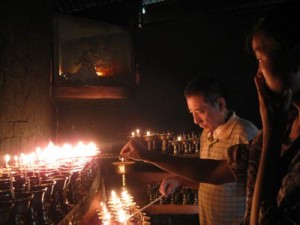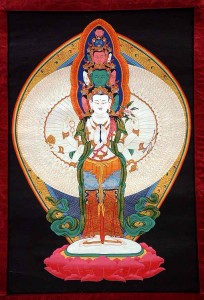
The following is an excerpt from a teaching by Jetsunma Ahkon Lhamo called, “Bringing Virtue into Life”
If your eyes are open at all, you have seen that you have often boxed your own ears, that you have often hurt yourself by engaging in non-virtuous activity that has brought you suffering. Maybe you’ve had time to see a little bit of that. But I’ll tell you that according to the Buddha’s teaching, and this is the truth, every bit of non-virtuous behavior that you have engaged in will bring about unhappiness. So it’s not logical to engage in non-virtuous behavior and that includes the lesser non-virtuous behaviors. The big ones like killing, we can get that. Killing, stealing, that sort of thing, but what about simple selfishness? What about judgment of others? What about just not giving a big flip? Not caring? What about reading the newspaper and thinking “Wow millions of people are starving over there. Too bad.” You don’t think that’s a non-virtue? That’s how we read the paper, every day. Of course that’s a non-virtue. We’re not caring. We’re not praying for them. We’re not sending them anything. We’re not doing anything to help.
The Buddha also taught us that virtuous behavior brings about happiness, but we have exactly the opposite idea. Most of us don’t like to practice, for instance. We don’t like to sit down and practice. Who likes to sit down for two hours at a stretch? I don’t know about you, but I get fanny fatigue big time. Two hours at a stretch. That is not how I want to spend the day. So we think like that. We think “Oh, you know, if I sit down today and practice for two hours, I’m really going to suffer!” So we have this weird idea that virtuous activity like practice is going to bring about unhappiness, and it’s because of our lack of understanding. What we don’t realize is that yes, while we have maybe the antsy-ness or the fanny fatigue or whatever it is that we get, ultimately that two hours of practice will ripen. And when it ripens it will be like a precious jewel within your life. At some point there will be an event or a change or a lift or a gift or something that you very much need in your life. It will appear as though out of nowhere. and it can be directly traced to previous virtuous behavior.
The Buddha also teaches us that if we offer even something, if we’re very poor and all we have is something simple like a candle or a butter lamp. If we offer only that, placing it on an altar and with a full and generous heart visualize it as being everything that we have, everything that we could ever have and offer it to the Buddha and the Dharma and the Sangha and particularly to the Lama as the representative of all three, then let that merit be used to benefit sentient beings. What we don’t realize is that while that took some time out of our busy day, yes, and we did have to prepare a butter lamp or light the candle or whatever hardship we had to engage, still we have created unbelievable happiness for ourselves. Actually, the Buddha has taught that if we could manage to make that offering with complete and total absorption in the expanse of that generosity, then we would be reborn eventually in unmovable samadhi, complete happiness, because we are engaging in the kind of activity that creates the habitual tendency of supreme generosity.
We are taught also to make offerings of our body, speech and mind. For instance, we visualize that our body becomes like food and we offer our bodies. Of course, we don’t cut off pieces of ourselves. Nobody would want to eat that anyway, I don’t think. But we do visualize our body as being transformed into this nectar that nourishes all sentient beings, and without holding on to ourselves, we offer ourselves in that way. So we offer our bodies to benefit sentient beings. We offer our speech to benefit sentient beings. We practice so that what comes out of our mouth will be of benefit to others, such as mantra or teaching about Dharma or some spiritual advice. We try very hard to give our speech to benefit sentient beings. And we offer our minds as well to benefit sentient beings. We make that offering. The way that we practice that offering is by no longer using our mind as a vehicle by which to accomplish nonvirtue. Instead we use our mind as a vehicle by which to accomplish virtue for the sake of sentient beings. That is the true meaning of offering our body, our speech and our mind.
Many practitioners unfortunately say that. They say “I offer my body, speech and mind” and they make all kinds of grand gestures but, boy, when it comes down to the clinch, they ain’t offering nothing, and that’s the truth. Not a thing. It isn’t happening. So we, as Dharma practitioners, have to learn how to practice more deeply than that in order to assimilate the causes for true happiness. It is that kind of virtuous activity that we have to engage in.
Copyright © Jetsunma Ahkon Norbu Lhamo. All rights reserved








